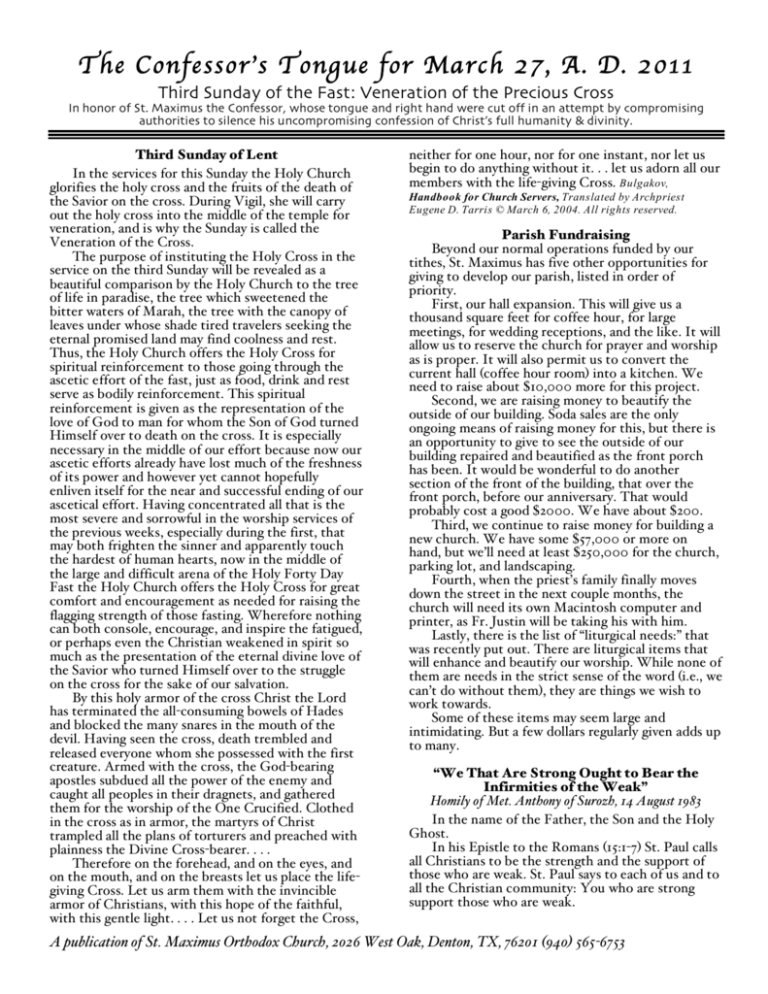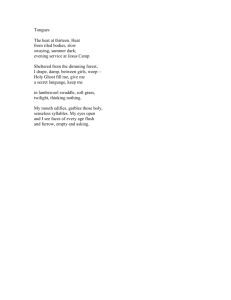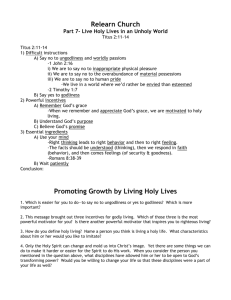
The Confessor’s Tongue for March 27, A. D. 2011
Third Sunday of the Fast: Veneration of the Precious Cross
In honor of St. Maximus the Confessor, whose tongue and right hand were cut off in an attempt by compromising
authorities to silence his uncompromising confession of Christ’s full humanity & divinity.
Third Sunday of Lent
In the services for this Sunday the Holy Church
glorifies the holy cross and the fruits of the death of
the Savior on the cross. During Vigil, she will carry
out the holy cross into the middle of the temple for
veneration, and is why the Sunday is called the
Veneration of the Cross.
The purpose of instituting the Holy Cross in the
service on the third Sunday will be revealed as a
beautiful comparison by the Holy Church to the tree
of life in paradise, the tree which sweetened the
bitter waters of Marah, the tree with the canopy of
leaves under whose shade tired travelers seeking the
eternal promised land may find coolness and rest.
Thus, the Holy Church offers the Holy Cross for
spiritual reinforcement to those going through the
ascetic effort of the fast, just as food, drink and rest
serve as bodily reinforcement. This spiritual
reinforcement is given as the representation of the
love of God to man for whom the Son of God turned
Himself over to death on the cross. It is especially
necessary in the middle of our effort because now our
ascetic efforts already have lost much of the freshness
of its power and however yet cannot hopefully
enliven itself for the near and successful ending of our
ascetical effort. Having concentrated all that is the
most severe and sorrowful in the worship services of
the previous weeks, especially during the first, that
may both frighten the sinner and apparently touch
the hardest of human hearts, now in the middle of
the large and difficult arena of the Holy Forty Day
Fast the Holy Church offers the Holy Cross for great
comfort and encouragement as needed for raising the
flagging strength of those fasting. Wherefore nothing
can both console, encourage, and inspire the fatigued,
or perhaps even the Christian weakened in spirit so
much as the presentation of the eternal divine love of
the Savior who turned Himself over to the struggle
on the cross for the sake of our salvation.
By this holy armor of the cross Christ the Lord
has terminated the all-consuming bowels of Hades
and blocked the many snares in the mouth of the
devil. Having seen the cross, death trembled and
released everyone whom she possessed with the first
creature. Armed with the cross, the God-bearing
apostles subdued all the power of the enemy and
caught all peoples in their dragnets, and gathered
them for the worship of the One Crucified. Clothed
in the cross as in armor, the martyrs of Christ
trampled all the plans of torturers and preached with
plainness the Divine Cross-bearer. . . .
Therefore on the forehead, and on the eyes, and
on the mouth, and on the breasts let us place the lifegiving Cross. Let us arm them with the invincible
armor of Christians, with this hope of the faithful,
with this gentle light. . . . Let us not forget the Cross,
neither for one hour, nor for one instant, nor let us
begin to do anything without it. . . let us adorn all our
members with the life-giving Cross. Bulgakov,
Handbook for Church Servers, Translated by Archpriest
Eugene D. Tarris © March 6, 2004. All rights reserved.
Parish Fundraising
Beyond our normal operations funded by our
tithes, St. Maximus has five other opportunities for
giving to develop our parish, listed in order of
priority.
First, our hall expansion. This will give us a
thousand square feet for coffee hour, for large
meetings, for wedding receptions, and the like. It will
allow us to reserve the church for prayer and worship
as is proper. It will also permit us to convert the
current hall (coffee hour room) into a kitchen. We
need to raise about $10,000 more for this project.
Second, we are raising money to beautify the
outside of our building. Soda sales are the only
ongoing means of raising money for this, but there is
an opportunity to give to see the outside of our
building repaired and beautified as the front porch
has been. It would be wonderful to do another
section of the front of the building, that over the
front porch, before our anniversary. That would
probably cost a good $2000. We have about $200.
Third, we continue to raise money for building a
new church. We have some $57,000 or more on
hand, but we’ll need at least $250,000 for the church,
parking lot, and landscaping.
Fourth, when the priest’s family finally moves
down the street in the next couple months, the
church will need its own Macintosh computer and
printer, as Fr. Justin will be taking his with him.
Lastly, there is the list of “liturgical needs:” that
was recently put out. There are liturgical items that
will enhance and beautify our worship. While none of
them are needs in the strict sense of the word (i.e., we
can’t do without them), they are things we wish to
work towards.
Some of these items may seem large and
intimidating. But a few dollars regularly given adds up
to many.
“We That Are Strong Ought to Bear the
Infirmities of the Weak”
Homily of Met. Anthony of Surozh, 14 August 1983
In the name of the Father, the Son and the Holy
Ghost.
In his Epistle to the Romans (15:1-7) St. Paul calls
all Christians to be the strength and the support of
those who are weak. St. Paul says to each of us and to
all the Christian community: You who are strong
support those who are weak.
A publication of St. Maximus Orthodox Church, 2026 West Oak, Denton, TX, 76201 (940) 565-6753
The Confessor’s Tongue
March 27, 2011; page 2
This must make us ponder. Are we to be called
strong as contrasted with anyone else? Don't we
realise, each of us, how frail and how weak we are?
Don't we feel that, whatever desire we have to be
God's own people, we have no strength and no power
to achieve our human and our Christian vocation?
And at this point we must remember another saying
of St. Paul; he too felt that he was weak, that he did
not possess all the strength he needed to fulfil his
apostolate, and he prayed the Lord to give him
strength. The Lord answered him and said: My
strength makes itself manifest in weakness
(2 Cor. 12:9). And St. Paul, having understood
what that meant, exclaims: So I shall glory in nothing
but my weakness, because then all will be an act of
God.
But this weakness is not cowardice, timidity,
sloth, laziness: everything that could be called inertia
and that prevents us from doing those things which
we believe to be right, which our heart longs for,
which our mind understands to be the best, the
holiest, and yet which our will is incapable of bringing
into operation. It is a different weakness; rather the
awareness that we cannot achieve the greatness to
which we are called unless God helps us. Because we
are all called to be the sons and the daughters of the
Most High, to be God's own children; indeed, by
adoption, but once adopted, to be as completely and
perfectly God's children as the Only-begotten Son of
God was the Son of God.
But what does it mean that we should support,
help, uphold those who are weak? Perhaps we can
find the beginning of an answer in today's Gospel
(Matthew 9:27-35). Christ was confronted with the
blind man. He gave him sight. We are surrounded by
people who are blind — not physically, but in so
many ways, people who need to acquire a vision and
sight which would allow them to grow to the full
measure of their stature and to be truly happy. Not in
the superficial sense of enjoying the good things of
life that leave us all hungry and full of longing, but
with another happiness.
What are the things to which we can open the
eyes of others? First of all, make people around us see
how great they are, how important they are to God.
Each of us was not only willed, but loved into
existence by God. Each of us means so much to God
that He gave His Only-begotten Son for our
salvation: all His Life, His Passion and His Death.
This is what each of us, all human beings in the
world, mean to God. This is what so few realise —
that they are infinitely precious, with the infinity of
God. Also, that there is in them this hunger, and the
hunger is too great for the things of this created
world to satisfy. Only God can fill them; but in order
to see God, have we not heard, Sunday after Sunday,
read time and again, the words of Christ “Blessed are
the pure in heart for they shall see God”? So we must
call every person around us to venerate, to reverence
his own purity and to fight for the purity of his mind,
the purity of his heart, the purity of his life, so that
becoming gradually less opaque, then translucent,
then perfectly transparent, the mind and the heart of
man can perceive God.
At this point, everyone can turn to us and say
"Physician, heal thyself." And indeed we can help
others only if we ourselves struggle and strive to be
great with the purity that allows us to set God, with
the greatness of God, of the Only-begotten Son
become the Son of men. There are many other things
which we may discover which are forms of blindness
in us and in others. Whenever we discover them, we
must help others to discern them, because even if we
ourselves are not truly capable of being what we
should be, at our words others may achieve what we
are too slack or too weak, to do.
And so it is also with the man who was deprived
of speech. How many, how many are speechless
before the greatness of God and the beauty of their
own selves? There is no way of discovering who and
what God is unless we discover holiness and beauty in
us. A Russian preacher said once "When God looks
at us He does not see the virtues or the achievements
which are not there; He sees the eternal beauty which
He has implanted in each of us."
This is our message to every person, and this is
the message of every person to us: reverence, love,
fulfil this beauty, become great! And then we will
have done what St. Paul calls us to do in today's
Epistle: we will have supported those who are frail
and weak, not with our strength, but with the
strength of God, because all things are possible in the
Spirit of God that upholds us. Amen.
Lenten Notes
On the five Sundays of the Great Fast, instead of
the usual Liturgy of St. John Chrysostom the older
Liturgy of St. Basil the Great is served. Besides these
five Sundays, it is also served twice during Holy
Week on Holy Thursday and Holy Saturday, on the
eves of Nativity and Theophany, and on January 1,
the Feast of St. Basil. Its anophora is a complete
summation of what God has done for our salvation,
and the intercession offered in it for the Church and
world is most detailed. We shall be examining it in a
few weeks at Basics Class.
Upcoming Events 2011
29 March, Tuesday: St. Maria Study Group meets at
Anna Stokes’ to read St. Basil the Great’s Homily
“I Will Tear Down My Barns”, 8:00 p.m.
13 April, Wednesday, 9:30 – 1:30 St. Maximus’s next
time to work at “Our Daily Bread” the local soup
kitchen.
24 April: Holy Pascha: The Feast of Feasts!
7 May: Church Yard Sale
30 May: Memorial Day Picnic
28-31 July: Ten-Year Anniversary Celebration
Glory be to God in all things!
2









